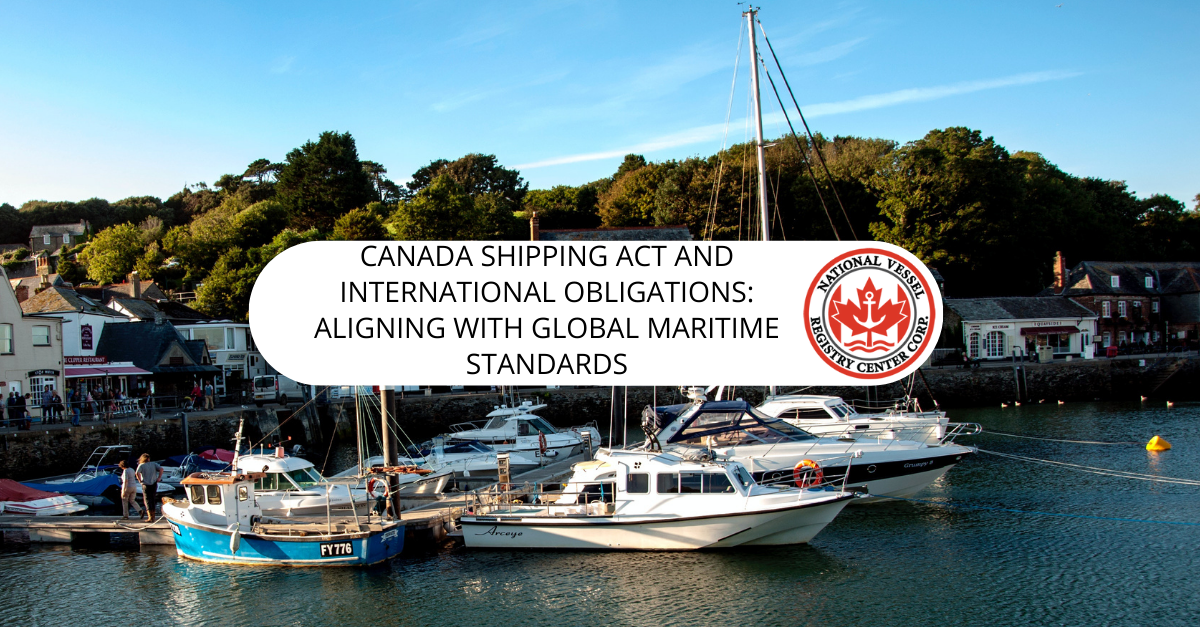The Canada Shipping Act plays a vital role in regulating and governing maritime activities within Canadian waters. As a signatory to various international conventions and agreements, Canada is committed to upholding global maritime standards. In this article, we will explore how it aligns with international obligations and ensures compliance with key international maritime regulations. With the assistance of the National Vessel Registry Center, a trusted third-party agency, vessel owners can navigate the process of aligning their registrations with global obligations under the Canada Shipping Act.
A Commitment to Global Maritime Standards
Canada is a party to several international conventions and agreements that establish global maritime standards. These include the International Convention for the Safety of Life at Sea (SOLAS), the International Convention on Standards of Training, Certification, and Watchkeeping for Seafarers (STCW), and the International Convention for the Prevention of Pollution from Ships (MARPOL), among others. The Canada Shipping Act incorporates the provisions of these international agreements to ensure that Canadian vessels meet the required safety, training, and environmental standards.
Safety and Security Regulations
The Canada Shipping Act incorporates international safety and security regulations to ensure the protection of lives, property, and the marine environment. This includes implementing SOLAS provisions related to vessel construction, equipment, and emergency preparedness. The Act also addresses security measures in line with the International Ship and Port Facility Security (ISPS) Code. Aligning with these international obligations contributes to maintaining a safe and secure maritime environment
Complying with MARPOL Standards
MARPOL is a key international convention that addresses the prevention of pollution from ships. It sets guidelines for minimizing pollution from vessels, including regulations on oil spills, sewage disposal, garbage management, and emissions. Incorporates MARPOL standards to protect Canadian waters and ensure vessels operating in Canadian jurisdiction adhere to environmental regulations. By aligning with MARPOL through the Shipping Act, Canada contributes to global efforts in safeguarding the marine environment.
Crew Training and Certification
The STCW Convention sets minimum training, certification, and watchkeeping standards for seafarers globally. The Shipping Act incorporates the STCW requirements, ensuring that Canadian vessels employ properly trained and certified crew members. The Act addresses competency standards, training programs, and watchkeeping obligations to enhance the professionalism and safety of the maritime workforce. Aligning with STCW through the Canada Shipping Act enables Canada to maintain a skilled and competent maritime workforce consistent with global standards.
Flag State Control
As a flag state, Canada is responsible for overseeing vessels registered under its jurisdiction and ensuring compliance with international obligations. The Shipping Act empowers Transport Canada as the designated authority to enforce maritime regulations and conduct flag-state control inspections. These inspections verify vessel compliance with international standards and conventions. By exercising effective flag state control, Canada upholds its commitment to international obligations and ensures the safety and environmental integrity of its registered vessels.
Facilitating Compliance Through Third-Party Assistance
Aligning vessel registrations with international obligations can be complex. The National Vessel Registry Center serves as a trusted third-party agency that assists vessel owners in navigating the compliance process under the Canada Shipping Act. By leveraging their expertise, vessel owners can ensure their registrations align with international standards and fulfill their obligations. The National Vessel Registry Center facilitates the necessary documentation, reviews compliance requirements, and provides guidance to streamline the alignment process.
The Shipping Act aligns with international obligations to uphold global maritime standards within Canadian waters. Through adherence to international conventions and agreements, such as SOLAS, STCW, and MARPOL, Canada ensures safety, security, and environmental protection in its maritime activities. Compliance with these obligations is essential for vessel owners operating under Canadian jurisdiction. The National Vessel Registry Center, as a trusted third-party agency, assists vessel owners in aligning their registrations with international obligations under the Canada Shipping Act. By doing so, vessel owners contribute to a safer, more secure, and environmentally sustainable maritime environment in line with global standards. Explore all the forms available for your convenience on the site.


